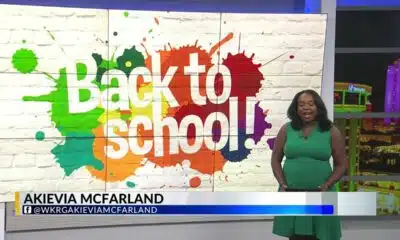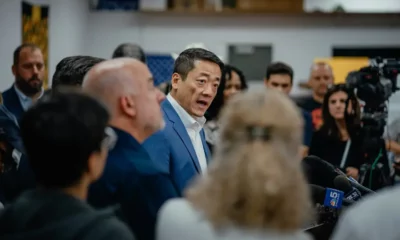News from the South - North Carolina News Feed
Where does Asheville Tourists’ concessions money go? Will local schools be impacted by federal DEI mandates? • Asheville Watchdog
Today’s round of questions, my smart-aleck replies and the real answers:

Question: I want to know if I go to an Asheville Tourists baseball game and pay the full price for a ticket, and buy two beers and two hot dogs, what’s the total cost for that? And how much of that goes to the DeWine organization? How much goes to the city?
My answer: I’m pretty sure most baseball stadium food, including this proposed meal, comes with a personal defibrillator.
Real answer: As we’ve previously reported, the Asheville Tourists Baseball Club is owned by the DeWine Seeds Silver Dollar Baseball LLC, which is owned by the family of Ohio Gov. Mike DeWine. DeWine’s son Brian is the president of the team and the owner-operator with his wife, Kali.
It seems like whenever Gov. DeWine, a Republican, makes some news in Ohio, I get some questions about the local team here and where the money goes. As we reported in 2022, the governor “personally owns 32 percent of the team, according to records, but has no management role in the team.” Brian DeWine, a resident of Asheville since 2010, calls the Tourists ‘a local, family-owned business.’”
Now, about those dogs and brews. First, Brian DeWine tried to upsell the fan.

“Are you sure your reader doesn’t also want to wash that down with a deep-fried moon-pie? Or a churro sundae?” DeWine asked.
Tempting, but I think they were hoping to live at least until Sunday.
“A beer is going to be $8-$9 and $1 and $3 on Thirsty Thursday,” DeWine said. “Hotdogs are $3.75, except on Fridays when they are $1.”
Tickets start at $9.50 for kids, $10.50 for military and seniors and $11.50 for an adult, he added, noting that all prices include sales tax. So under normal conditions, it looks like you’d be dropping $35 to get in, scarf down two ‘dogs and two beers, and enjoy the game.
The Tourists run the complete food and beverage operation, so the city, which owns McCormick Field, does not reap any financial benefits from it.
“The city does not collect a portion of food and beverage sales during baseball games at McCormick; we do however collect an annual rent payment from the team,” Chris Corl, the city of Asheville’s director of community and regional entertainment facilities, said via email. “This year’s rent is lower than ‘normal’ due to disruptions related to the construction project.”
The 2025 season at McCormick Field is being played “under construction,” as DeWine previously told The Watchdog. Some areas of the ballpark will be closed to fans during certain parts of the season, as the stadium undergoes a $38.5 million renovation project to comply with dictates from Major League Baseball to upgrade locker rooms and other facilities.
Corl provided the city’s rental rates for McCormick Field for last year, this year and next year:
- 2024: $100,000
- 2025: $50,000
- 2026: $450,000
The Tourists had their home opener April 8, although it was a rainy affair. The team’s 132-game schedule this year features 66 home games, including matchups on July 4, Mother’s Day, Memorial Day Weekend, and Labor Day Weekend.

Question: I haven’t heard any communications from the Asheville City Schools superintendent or the Buncombe County Schools district on how they are handling the Trump administration’s attack on DEI (diversity, equity and inclusion). I know that the ACS central office does have a fulltime staff member committed to equity, but I have not heard anything about changes in its programming or staffing. Might make for an interesting article to reach out to the Districts to ask what they are doing to respond to Trump’s and the Department of Education’s blocking of funding for districts with DEI policies or programs.
My answer: They’re keeping mum? Really? That’s odd in this climate …
Real answer: Asheville City Schools Chief of Staff Kimberly Dechant answered on behalf of city schools.
“At this time, Asheville City Schools remains committed to its mission of fostering an inclusive and equitable environment for ALL students and staff,” Dechant said via email (emphasis on “ALL” was hers). “There have been no changes to our programming or staffing related to Diversity, Equity, and Inclusion.”
On April 3, the Trump administration’s Department of Education sent a “reminder” notice to school systems titled, “Reminder of Legal Obligations Undertaken in Exchange for Receiving Federal Financial Assistance and Request for Certification under Title VI and SFFA v. Harvard.”
The court reference refers to the 2023 U.S. Supreme Court ruling in Students for Fair Admissions v. Harvard University and UNC Chapel Hill, which essentially banned consideration of race in college admissions.
The reminder notice sent to schools further states: “Title VI of the Civil Rights Act of 1964 provides that ‘no person in the United States shall, on the ground of race, color, or national origin, be excluded from participation in, be denied the benefits of, or be subjected to discrimination under any program or activity receiving federal financial assistance.”
As NPR reported last week, in its latest DEI directive to K-12 school leaders, “the Trump administration has asked every state and local school leader to recommit to Title VI of the Civil Rights Act, which prevents race-based discrimination for federally funded programs. It says states that fail to recertify could lose their federal funds, including grants intended for low-income students.”
(On Thursday, a federal judge ruled that the Trump’s administration had overstepped the executive branch’s legal authority over local schools and had not provided a sufficient definition of DEI.)
Dechant said ACS is “closely monitoring developments at both the federal and state levels regarding any potential legislation or policy changes that may impact DEI initiatives.
“Until such legislation is passed and its implications are clarified, we will maintain our current approach and continue to prioritize equity in education for ALL students,” Dechant said, again emphasising “all.”
At Buncombe County Schools, spokesperson Ken Ulmer said the system “continues to comply with all federal, state, and local laws.
“Buncombe County Schools does not have any dedicated positions such as diversity officers,” Ulmer said. “As a school system, BCS is committed to serving each and every student in our district with the respect, support, and opportunities they deserve.”
The county system does have Assistant Superintendent Jamie Johnson’s role listed on its website as “Educational Equity and Student Support.”
Asheville Watchdog welcomes thoughtful reader comments on this story, which has been republished on our Facebook page. Please submit your comments there.\
Asheville Watchdog is a nonprofit news team producing stories that matter to Asheville and Buncombe County. Got a question? Send it to John Boyle at jboyle@avlwatchdog.org or 828-337-0941. His Answer Man columns appear each Tuesday and Friday. The Watchdog’s reporting is made possible by donations from the community. To show your support for this vital public service go to avlwatchdog.org/support-our-publication/.
Related
The post Where does Asheville Tourists’ concessions money go? Will local schools be impacted by federal DEI mandates? • Asheville Watchdog appeared first on avlwatchdog.org
News from the South - North Carolina News Feed
Body of missing NC teen found in Florida, family says
SUMMARY: The body of missing North Carolina teen Gio Gio was found in Bradenton, Florida, confirmed by his family. Originally, Gio Gio was supposed to be picked up by relatives after meeting cousins in Florida, but he disappeared after texting his mother for help. His family’s private investigators, not the police, discovered his body near I-75 after police had initially searched the area. Gio Gio’s mother expressed her heartbreak on Facebook, calling it every parent’s worst nightmare. The investigation continues, focusing on the timeline after Gio Gio entered the car with his cousins. An autopsy is pending, with no immediate signs of foul play.
The body of Giovanni Pelletier was found in a retention pond, authorities said, and his mom is living “every parent’s worst nightmare.”
https://abc11.com/post/giovanni-pelletier-body-missing-18-year-old-north-carolina-found-pond-where-last-seen-family-says/17483056/
Download: https://abc11.com/apps/
Like us on Facebook: https://www.facebook.com/ABC11/
Instagram: https://www.instagram.com/abc11_wtvd/
Threads: https://www.threads.net/@abc11_wtvd
TIKTOK: https://www.tiktok.com/@abc11_eyewitnessnews
X: https://x.com/ABC11_WTVD
News from the South - North Carolina News Feed
‘Highballed’: Data shows tax assessment inequalities affecting longtime homeowners
SUMMARY: Longtime homeowners in historically Black neighborhoods like Hillsborough face disproportionate property tax burdens compared to wealthier, mostly white areas nearby. Beverly Walton, a 66-year resident of Renshaw Street, inherited her home but struggles to afford rising taxes despite no renovations. Her house, valued lower than newer homes, is taxed at a higher rate, leading to financial strain on fixed incomes. Data from Wake, Durham, and Orange counties reveal majority nonwhite neighborhoods pay about $9 more per $100,000 in home value, despite lower average home prices. Advocates call for fairer assessments to prevent pricing out longtime residents amid regional growth.
Data shows tax assessment inequalities affecting longtime homeowners
https://abc11.com/post/highballed-data-shows-tax-assessment-inequalities-affecting-longtime-homeowners/17473973/
Download: https://abc11.com/apps/
Like us on Facebook: https://www.facebook.com/ABC11/
Instagram: https://www.instagram.com/abc11_wtvd/
Threads: https://www.threads.net/@abc11_wtvd
TIKTOK: https://www.tiktok.com/@abc11_eyewitnessnews
News from the South - North Carolina News Feed
Two deaths, sinkholes, downed trees: The impacts of severe flooding in Triangle
SUMMARY: Severe flooding in the Triangle region has caused two deaths, sinkholes, and downed trees. In Nash County, 55-year-old Raymond Evans Jr. and 24-year-old Lahie Alustin died after their minivan was swept into a ravine. Evans heroically tried to save Alustin after police efforts failed. A memorial has grown at the site. In Apex, heavy rain caused a sinkhole on Olive Chapel Road, collapsing a section already slated for repairs. Town officials are working with the Department of Transportation to expedite repairs, possibly earlier than the initially expected November timeline. Residents face detours and ongoing disruptions.
WRAL is tracking the impact of severe flooding that occurred all through Wednesday. Rain will continue on-and-off on Thursday, and it could be heavy at times.
-
Mississippi Today7 days ago
After 30 years in prison, Mississippi woman dies from cancer she says was preventable
-
News from the South - Texas News Feed7 days ago
Texas redistricting: What to know about Dems’ quorum break
-
News from the South - North Carolina News Feed5 days ago
Two people unaccounted for in Spring Lake after flash flooding
-
News from the South - Oklahoma News Feed2 days ago
Former payroll director ordered to prison, must repay district nearly $500,000
-
Mississippi Today6 days ago
Brain drain: Mother understands her daughters’ decisions to leave Mississippi
-
News from the South - Tennessee News Feed4 days ago
Trump’s new tariffs take effect. Here’s how Tennesseans could be impacted
-
News from the South - Georgia News Feed7 days ago
29-year-old killed after driving off road in 'dangerous' section road | FOX 5 News
-
News from the South - Louisiana News Feed7 days ago
Plans for Northside library up for first vote – The Current










































